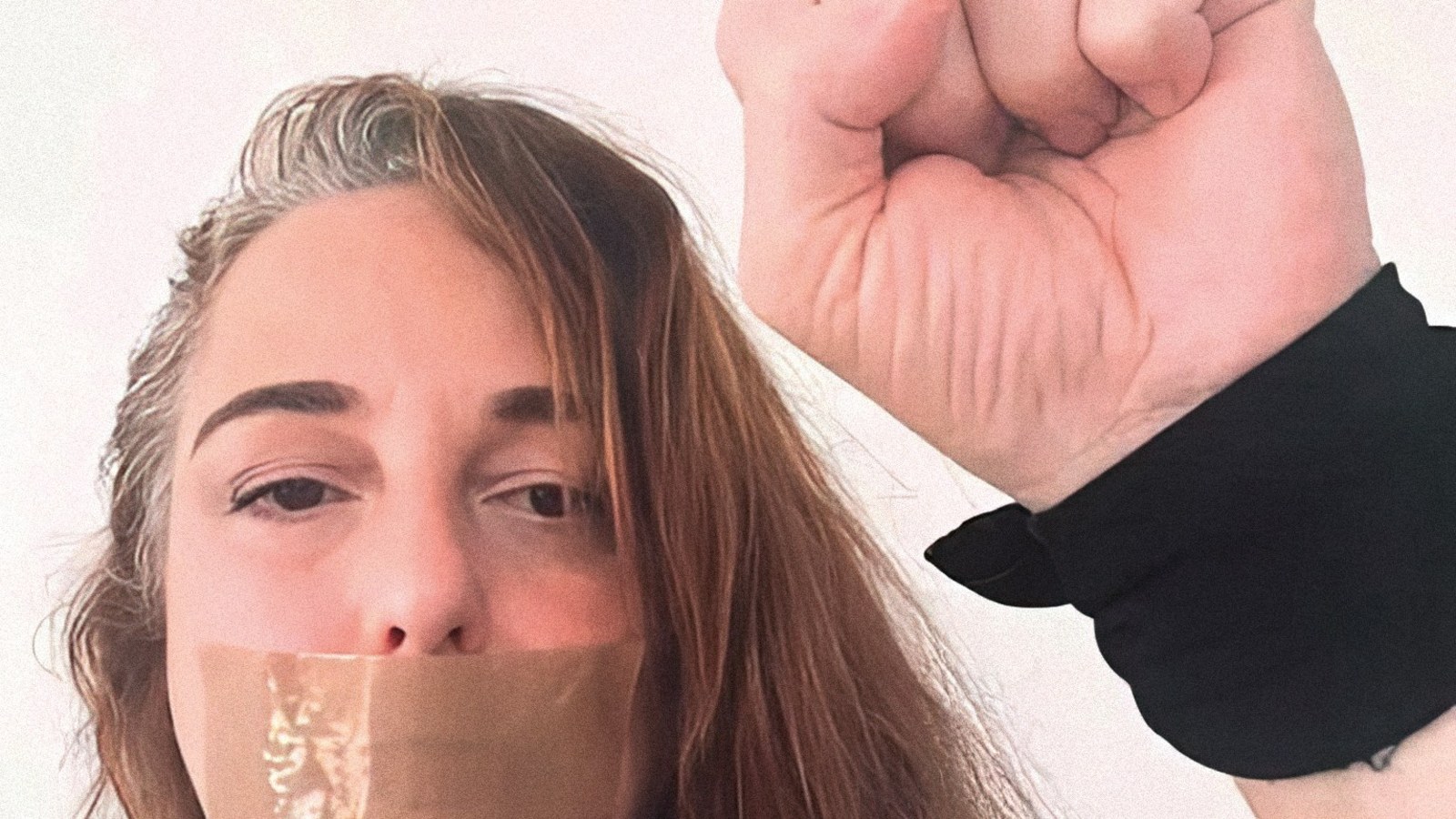


Die kubanische Künstlerin und Aktivistin Tania Bruguera (geb. 1968 in Havanna, Kuba) konzipiert speziell für das Interimsquartier des Museums Villa Stuck ein Projekt zum Thema Zensur mit dem Titel „The Condition of No“.
Vor dem Hintergrund eigener Erfahrungen der Zensur und des Machtmissbrauchs in Kuba und in anderen Ländern nutzt Tania Bruguera Kunst als ein Mittel, sozialen und politischen Wandel zu initiieren. International setzt sie sich in ihren Performances und Ausstellungen an der Schnittstelle von Kunst und Politik für freie Rede und gegen Zensur ein.
2022 präsentierte sie auf der documenta fifteen in Kassel das von ihr im Jahr 2015 gegründete Kollektiv INSTAR (Instituto de Artivismo Hannah Arendt). Ziel des Kollektivs ist der Aufbau eines besseren und friedlicheren Kuba, in dem die Menschenrechte respektiert werden und die Menschen ihre Meinung frei äußern können.
Im Februar 2024 zeigte Tania Bruguera im Hamburger Bahnhof – Nationalgalerie der Gegenwart, Berlin, ihre Performance Where Your Ideas Become Civic Actions (100 Hours Reading “The Origins of Totalitarianism“), eine 100-stündige Lesung von Hannah Arendts Buch„Elemente und Ursprünge totaler Herrschaft“. Die Lesung wurde von Protesten unterbrochen. Am nächsten Morgen wurde die Performance geschlossen.
Die Entwicklungen in der deutschen Kulturszene betrachtet Tania Bruguera mit Sorge: Dabei denkt sie an das Unvermögen zu sprechen anlässlich der Antisemitismus-Fälle auf der documenta fifteen, die Ausladungen von Künstler*innen und Schriftsteller*innen im Zusammenhang mit der BDS-Resolution, die Aufrufe zum Boykott deutscher Kulturinstitutionen unter dem Label „Strike Germany“ sowie die jüngste Debatte um eine Antidiskriminierungs-Klausel in der Berliner Kulturverwaltung.
Tania Bruguera schreibt hierzu:
Even though the circumstances, culture and history are different, I have felt things in Germany that I recognize from previous experiences of surveillance and intolerance. I have witnessed collective fear and silencing, followed by punitive measures and cancellations. When I conceived the public program of „The Condition of No“, there was not much public discussion in Germany about these sensitive issues. I began to wonder how collective processing would impact the future.
Tania Bruguera nimmt die aktuelle Situation zum Anlass, um unter dem Titel „The Condition of No“ ein vielfältiges Programm zu konzipieren, welches das Thema „Zensur“ aus verschiedenen Blickwinkeln beleuchtet.
„The Condition of No“ besteht aus drei Teilen:
Während die auf den Erfahrungen des kubanischen Kollektivs INSTAR basierende Ausstellung die Mechanismen von Propaganda, Zensur und Protest in den Fokus nimmt, setzt das transnationale INSTAR Film Festival den Schwerpunkt auf chinesische Filme, die unabhängig von offiziellen Institutionen der Regierung produziert wurden. Der dritte Teil des Programms, eine Gesprächsreihe zum Thema „The Condition of No“, richtet den Blick auf die Situation in Deutschland. In Gesprächen werden Beispiele zu Boykott, Zensur und Protest konkret beschrieben und analysiert.
Ziel und Hoffnung von „The Condition of No“ ist es, Verständnis, Differenzierung und Kommunikation in einer aktuell schwierigen Sachlage zu ermöglichen. Seit Jahrzehnten setzt sich Tania Bruguera in Kuba für freie Rede und gegen Zensur ein. Sie blickt mit den Erfahrungen aus einem anderen Kulturkreis auf die Situation in Deutschland. Dies bietet die Chance, gewohnte Standpunkte zu überdenken und Neues zu erkennen. Es geht vor allem darum, einen angstfreien Raum zu schaffen, in dem man reden kann.
Konzipiert von Tania Bruguera für INSTAR
Kuratiert von Roland Wenninger
Ein Projekt des Museums Villa Stuck in Kooperation mit INSTAR
“THE CONDITION OF NO”—ABOUT THE PROJECT (EN)
Cuban artist and activist Tania Bruguera (b. 1968 in Havana, Cuba) has conceived a project about censorship titled “The Condition of No” especially for the temporary home of the Museum Villa Stuck.
Shaped by personal experiences of censorship and abuse of power in Cuba and other places, Bruguera uses art to initiate social and political change. Through her performances and exhibitions at the intersection of art and politics, she has become an international advocate for free speech and against censorship.
In 2022, she presented the INSTAR collective (Instituto de Artivismo Hannah Arendt) she had founded in 2015 at documenta fifteen in Kassel. The aim of the collective is to build a better and more peaceful Cuba in which human rights are respected and people can express their opinions freely.
In February 2024, Tania Bruguera presented her performance “Where Your Ideas Become Civic Actions (100 Hours Reading ’The Origins of Totalitarianism’)” at Hamburger Bahnhof – Nationalgalerie der Gegenwart in Berlin. The reading of Hannah Arendt's book was disrupted by protesters. It was stopped the following morning.
Bruguera views developments in the German cultural scene with concern, citing as reasons the inability to discuss cases of anti-Semitism at documenta fifteen; the disinvitations of artists and writers based on the anti-BDS law; the calls to boycott German cultural institutions under the label “Strike Germany,” and the recent debate about an anti-discrimination clause for arts funding in Berlin.
As Tania Bruguera writes:
“Even though the circumstances, culture and history are different, I have felt things in Germany that I recognize from previous experiences of surveillance and intolerance. I have witnessed collective fear and silencing, followed by punitive measures and cancellations. When I conceived the public program of ‘The Condition of No,’ there was not much public discussion in Germany about these sensitive issues. I began to wonder how collective processing would impact the future.”
Tania Bruguera has taken the current situation as an opportunity to create a diverse program examining the issue of censorship from different angles.
“The Condition of No” is a three-part program:
An exhibition based on the experiences of the Cuban INSTAR collective looks at the mechanisms of propaganda, censorship, and protest, while the transnational INSTAR Film Festival focuses on Chinese films that have been produced independently of official government institutions. The third part, a series of talks on “The Condition of No” draws attention to the situation in Germany, discussing examples of boycotts, censorship, and protests.
“The Condition of No” seeks to facilitate understanding, differentiation and communication in what is currently a precarious situation. Tania Bruguera has been campaigning for free speech and against censorship in Cuba for decades. Her view of the situation in Germany is shaped by the experience of another culture. This offers an opportunity to rethink familiar points of view and recognize fresh possibilities. More than anything, it is about creating a fear-free space in which people can talk.
Conceived by Tania Bruguera for INSTAR
Curated by Roland Wenninger
A project of the Museum Villa Stuck in cooperation with INSTAR
„The Condition of No“ – Die Ausstellung
Die Ausstellung in den Räumen der Goethestraße 54 stellt die Mechanismen von Propaganda, Zensur und Protest in den Mittelpunkt. Ausgangspunkt der Präsentation sind die Erfahrungen des kubanischen Kunstkollektivs INSTAR (Instituto de Artivismo Hannah Arendt), das von Tania Bruguera geleitet wird. Die Idee zu INSTAR entstand im Zusammenhang mit einer hun-dertstündigen Lesung von Hannah Arendts „Elemente und Ursprünge totaler Herrschaft“ im Jahr 2015 in Tania Brugueras Haus in Havanna. Die Lesung führte zu Tania Brugueras Inhaftierung durch die kubanischen Behörden. INSTAR steht für Anti-Zensur, Redefreiheit und die Schaffung einer demokratischen Kultur.
Die Ausstellung „The Condition of No“ umfasst drei Räume.
Der erste Raum beschäftigt sich mit dem Thema „Propaganda“. Zu sehen sind „Cut-Outs“ des 1983 in Havanna, Kuba, geborenen Künstlers Hamlet Lavastida. Seine Arbeiten thematisieren Unterdrückung, Diktatur und Machtmissbrauch im Kontext propagandistischer Ikonographie. Zusammen mit anderen Intellektuellen, darunter auch Tania Bruguera, initiierte Hamlet Lavastida die Demokratiebewegung „27N“, die zu den größten Massenprotesten in der kubanischen Geschichte führte.
Im zweiten Raum werden die Mechanismen von Zensur anhand von Texten und grafischen Arbeiten dargestellt. Es ist ein didaktischer Raum, der beschreibt, wie Zensur in Systemen der Überwachung die Meinungs- und Redefreiheit der Menschen nach und nach einschränkt, bis Gefühle der Ausweglosigkeit und Angst entstehen.
Den dritten Raum widmet Tania Bruguera dem Thema „Protest“. Zu sehen sind u.a. Arbeiten von Claudia Patricia, die für die grafische Gestaltung des Kollektivs INSTAR zuständig ist. Die Radikalität der Gestaltung dieses Raums lässt Formen des Protests gegen Zensur und Überwachung körperlich und mental erfahrbar werden.
Laufzeit der Ausstellung: 5. September – 24. November 2024
Konzipiert von Tania Bruguera für INSTAR
Kuratiert von Roland Wenninger
The Condition of No – The Exhibition (en)
The exhibition in the rooms at 54 Goethestrasse focuses on the mechanisms of propaganda, censorship and protest. The experiences of the Bruguera-led Cuban art collective INSTAR (Instituto de Artivismo Hannah Arendt) provide the basis for the presentation. The idea for INSTAR was born from a one hundred-hour reading of Hannah Arendt’s “The Origins of Totalitarianism” in Tania Bruguera's house in Havana in 2015. This reading led to Tania Bruguera’s detainment by the Cuban authorities. INSTAR stands for anti-censorship, freedom of speech, and the creation of a democratic culture.
The exhibition “The Condition of No” comprises three rooms.
The first room explores the subject of “propaganda.” On display are cut-outs by Hamlet Lavastida, who was born in Havana in 1983. In his works he addresses repression, dictatorship, and abuse of power in the context of propagandist iconography. Together with other intellectuals, including Tania Bruguera, Hamlet Lavastida initiated the “27N” democracy movement, which led to the largest mass protests in Cuban history.
In the second room, texts and graphic works serve to illustrate the mechanisms of censorship. It is a didactic space in that it describes how censorship in systems of surveillance gradually restricts people’s freedom of opinion and speech until feelings of hopelessness and fear set in.
Tania Bruguera devotes the third room to the subject of “Protest.” The invited artist is Claudia Patricia who is the designer of INSTAR. The radical design of this room renders forms of protest in a physically and mentally tangible way.
Conceived by Tania Bruguera for INSTAR
Curated by Roland Wenninger
V. INSTAR Film Festival
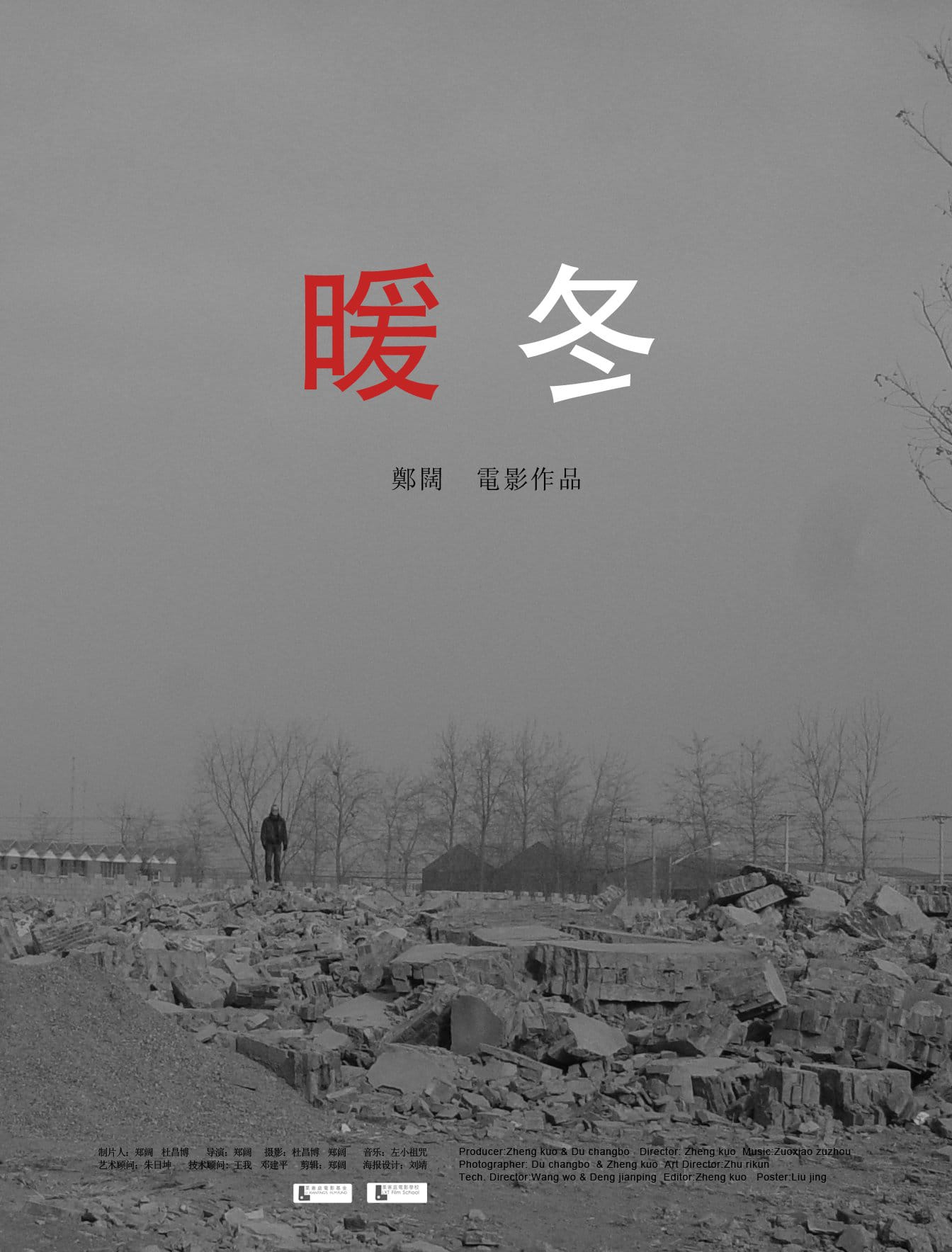
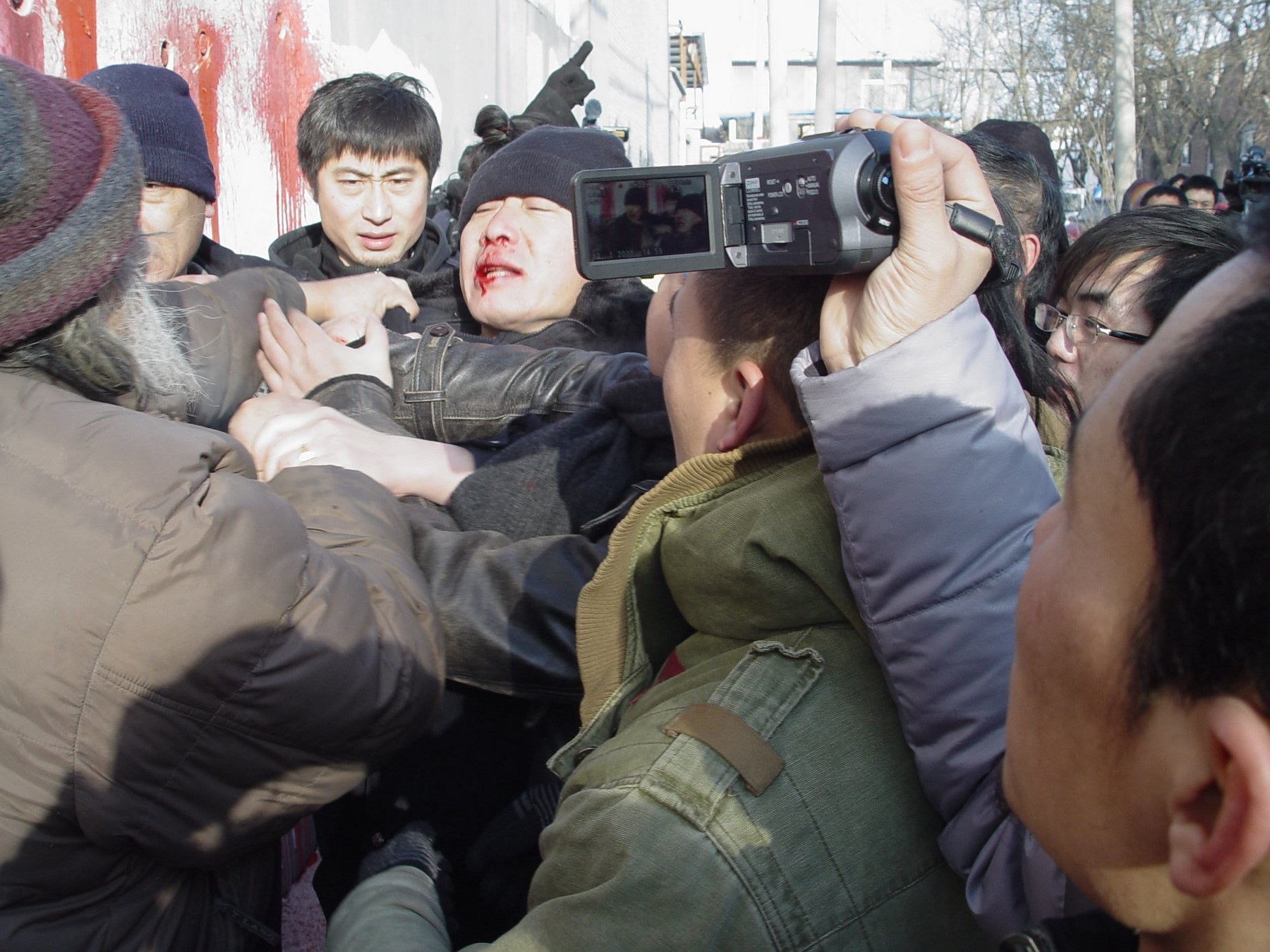
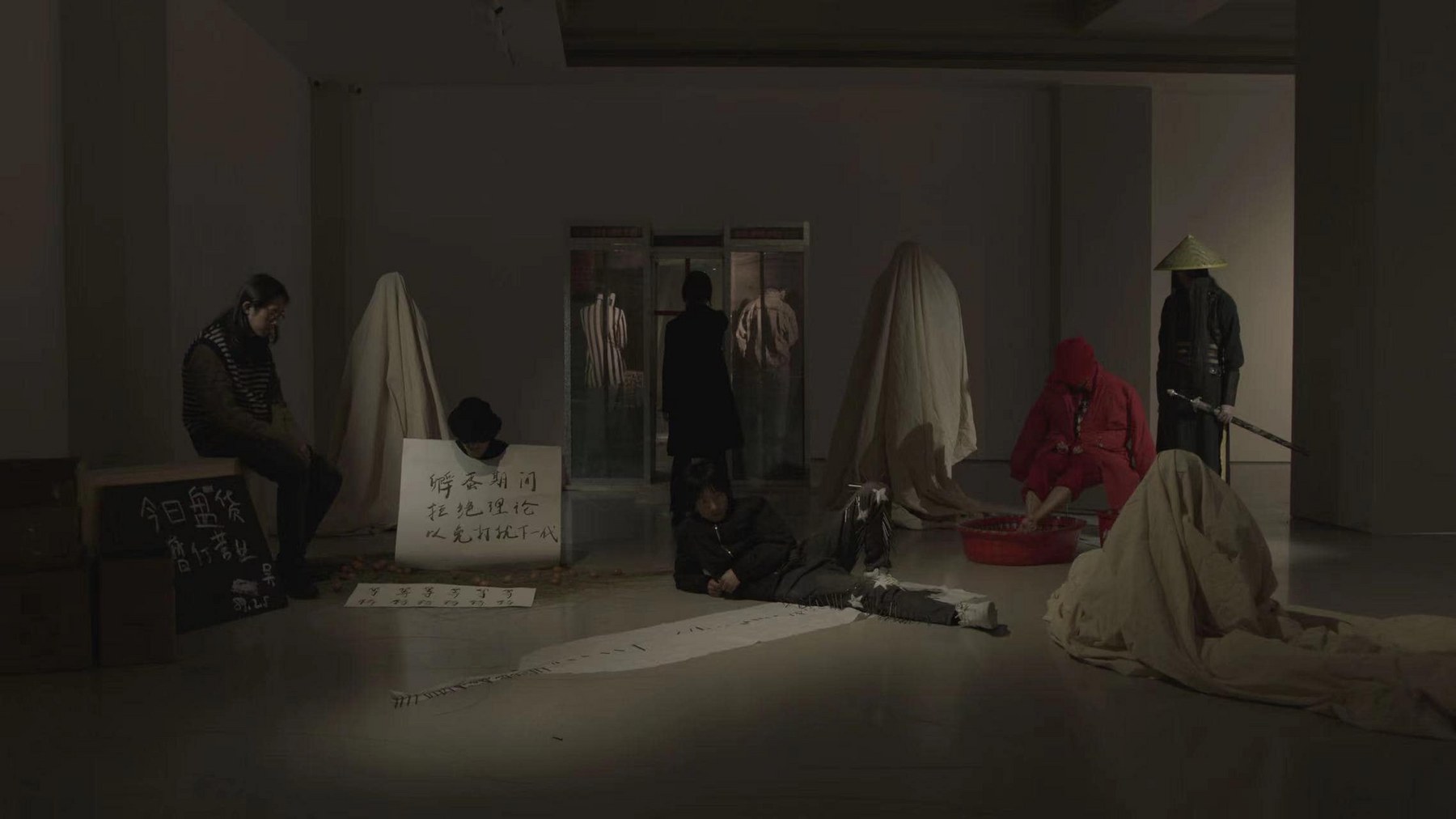

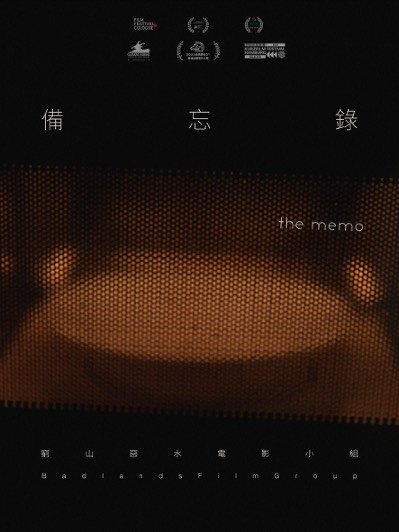
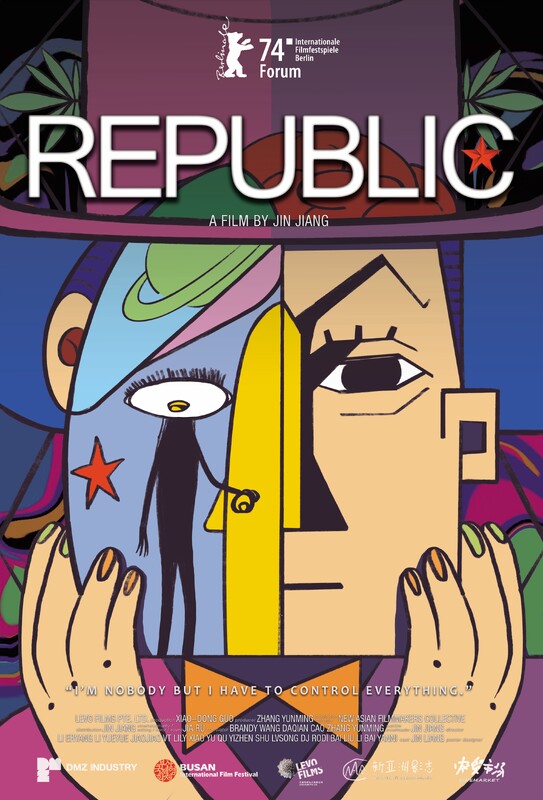
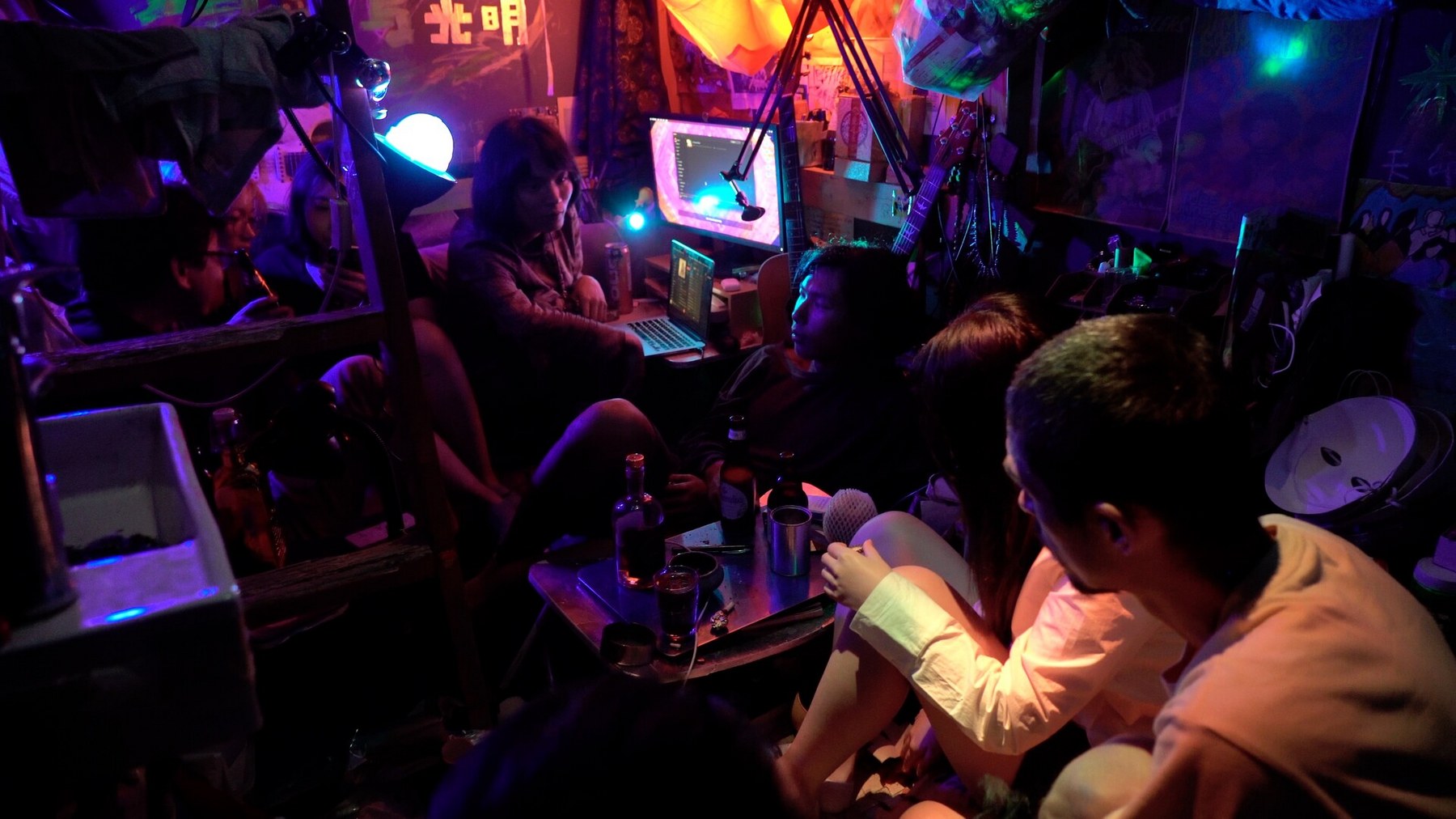
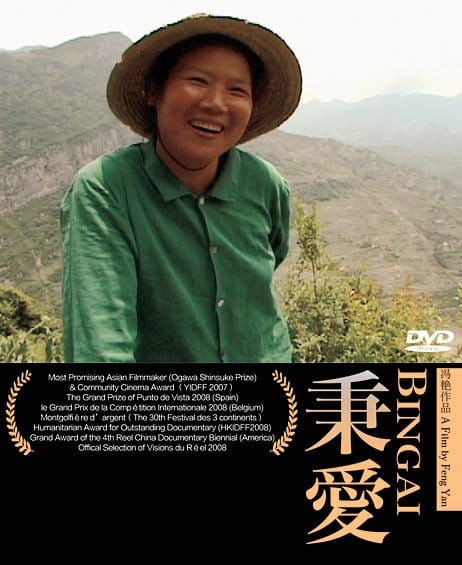
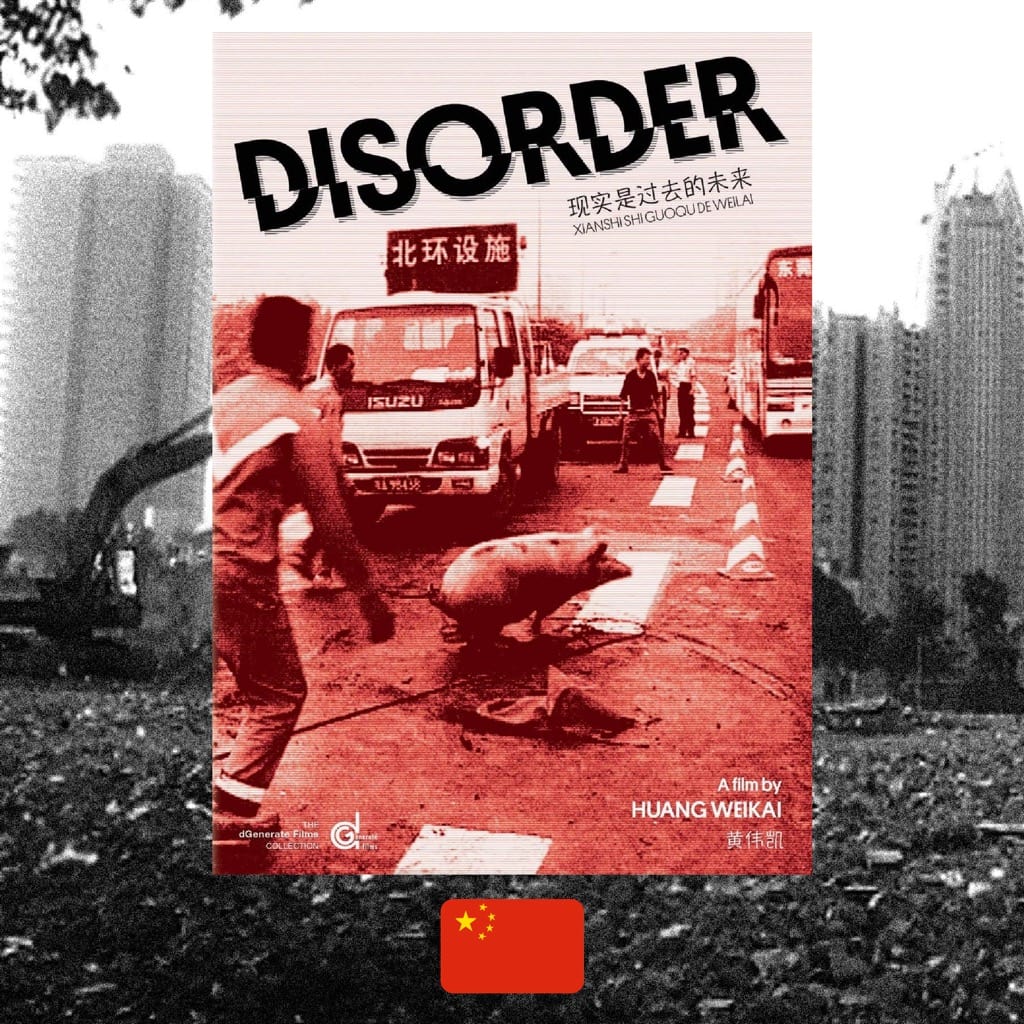
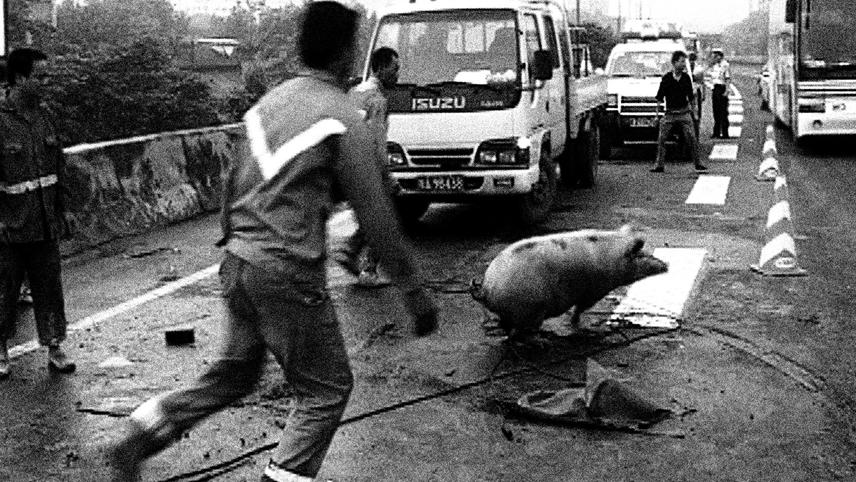
Retrospektive des unabhängigen chinesischen Kinos
5. INSTAR Filmfestival in Zusammenarbeit mit dem Chinese Independent Film Archive (CIFA) und der VS, dem Interimsquartier des Museums Villa Stuck
1. November 2024 – 3. November 2024
Die 5. Ausgabe des INSTAR Film Festivals wird von 1. bis 3. November in München gastieren.
Das INSTAR Film Festival ist eine jährliche Veranstaltung, die von INSTAR (Instituto de Artivismo Hannah Arendt), einem von Tania Bruguera im Jahr 2015 gegründeten Kollektiv, organisiert wird. Die erste Ausgabe des INSTAR-Filmfestivals fand im Dezember 2019 in Havanna statt. Es ist eine Filmschau, die unabhängige Produktionen auf internationaler Ebene unterstützt, insbesondere in Ländern, in denen die Meinungs- und Schaffensfreiheit bedroht ist.
Das Festival ist länderübergreifend angelegt, zeigt Filme und organisiert öffentliche Veranstaltungen zeitgleich an verschiedenen internationalen Orten. Die fünfte Ausgabe findet von 28. Oktober bis 3. November 2024 statt, mit Vorführungen und Podiumsdiskussionen in Madrid, Barcelona, Paris, Berkeley und München sowie einem gleichzeitigen Online-Programm für Kuba.
2024 zeigt das Festival in Zusammenarbeit mit dem Chinese Independent Film Archive (CIFA) eine Retrospektive des unabhängigen chinesischen Kinos. Zu sehen sind Werke, die ohne staatliche Genehmigung produziert wurden und in ihrem eigenen Land zensiert oder nicht gezeigt wurden, weil sie komplexe soziale oder politische Themen behandeln. Im Rahmen des Festivals wird es eine Wettbewerbssektion geben, in der sich die ausgewählten Filme, die hauptsächlich aus dem globalen Süden stammen, um den Nicolás-Guillén-Landrián-Preis bewerben. Der Preis ist zu Ehren eines der größten und rebellischsten Filmemachers Kubas benannt.
Leitung: José Luis Aparicio
1. November 2024
Eintritt frei
18:15 Uhr
Eröffnung des 5. INSTAR Filmfestival, München
Begrüßung: Roland Wenninger
Präsentation des 5. INSTAR Cuban Filmfestival: José Luis Aparicio, kubanischen Filmemacher
Vortrag über Filme in Ausstellungen, staatliche Filmzensur in China und die Arbeit des Chinese Independent Film Archive (CIFA): Professor Sabrina Qiong Yu, Universität Newcastle.
18:30 Uhr
The Cold Winter (2011, Regie: Zheng Kuo, China, 103 Min., OmeU)
Von Ende 2009 bis Anfang 2010 wurden einige der Kunstviertel in der Nähe der 798 Art Zone in Peking gewaltsam geräumt. Der Widerstand, der Kampf, das Zögern und die Richtungskämpfe der Künstler rücken in diesem extrem kalten Winter in den Mittelpunkt.
Zheng Kuo ist ein chinesischer unabhängiger Produzent und Regisseur, der 2009 seinen Abschluss an der Li Xianting Film School machte. Er plante die Sektion unabhängiger Film des 798 Art Festival 2008 im UCCA-Zentrum für zeitgenössische Kunst in Peking. Außerdem war er Kurator der Sektion unabhängiger Film der 798 Biennale 2009 in Peking. Im Jahr 2010 machte er seinen ersten unabhängigen Dokumentarfilm 798 Station und den Kurzspielfilm Sound of Silence. Sein gefeierter Dokumentarspielfilm The Cold Winter dokumentiert die Pekinger Künstler-Demonstrationen von 2011. Burned Wings ist sein erster Spielfilm.
20:30 Uhr
The Second Interrogation (2022, Regie: Wang Tuo, China, 65 Min., OmeU)
Nach einer Veranstaltung über eine einflussreiche chinesische Ausstellung von 1989 diskutieren ein Künstler und ein Zensor über Sinn und Zweck der Kunst in einer autoritären Gesellschaft.
Wang Tuo ist ein 1984 in Changchun geborener Künstler. In seiner Arbeit verwebt er Fakten der chinesischen Geschichte, kulturelle Archive, Fiktion und Mythologie zu spekulativen Erzählungen. Er setzt seine filmische Praxis dem Schreiben von Romanen gleich und nimmt Eingriffe in historische literarische Texte und kulturelle Archive vor, um Geschichten zu formulieren, die die Grenzen von Zeit und Raum, Fakten und Fantasie verwischen. Das Werk Wang Tuos, das Film, Performance, Malerei und Zeichnung umfasst, ist eine eindringliche Auseinandersetzung mit der modernen chinesischen und ostasiatischen Geschichte.
2. November 2024
Tickets an der Museumskasse oder im Onlineshop
14:00 Uhr
An Asian Ghost Story (2023, Regie: Bo Wang, Hong Kong – Niederlande, 37 Min., OmeU)
Ein filmisch und konzeptionell einfallsreicher Film, der sich anhand des massiven Exports von Perücken während des Kalten Krieges mit den quälenden Erinnerungen an die Modernisierung Asiens im späten 20. Jahrhundert auseinandersetzt. In jeder Perücke wohnt jedoch ein Geist aus der imperialen Vergangenheit.
Bo Wang ist ein chinesischer Künstler, Filmemacher und Forscher, der in Amsterdam lebt. Sein Werk war bisher in zahlreichen Ausstellungen weltweit zu sehen, darunter im Guggenheim Museum und dem Museum of Modern Art in New York, dem Garage Museum in Moskau, dem International Film Festival Rotterdam, CPH:DOX in Kopenhagen, Image Forum Festival in Tokio, Visions du Réel in Nyon, LUX & Open City Documentary Festival in London, DMZ Docs in Südkorea und Para Site in Hongkong. 2013 erhielt er ein Stipendium des Robert Flaherty Film Seminar und 2017–18 war er Artist-in-Residence an der ACC-Rijksakademie sowie 2016 an der NTU CCA.
15:00 Uhr
The Memo (2023, Regie: Badlands Film Group, China, 30 Min., OmeU)
The Memo ist ein Videotagebuch des Filmemacher-Paars während des surrealen Lockdowns, als die beiden in einer kleinen Mietwohnung in Shanghai festsaßen. Angesichts des endlosen Wahnsinns löst die Kamera sich allmählich vom Fenster und beobachtet eine in der Geschichte Chinas beispiellose soziale Isolation.
Badlands Film Group ist eine 2020 von Yang Xiao und Chen Sisi gegründete experimentelle Dokumentarfilmgruppe. Ihr jüngster Film, The Memo, wurde bei den 60. Golden Horse Awards in Taipei als bester Dokumentar-Kurzfilm ausgezeichnet.
16:00 Uhr
Republic (2023, Regie: Jin Jiang, China-Singapore, 107 Min., OmeU)
Eryang und seine Freunde, die in der Republic ein- und ausgehen, führen ein sorgloses Leben. Sie rauchen und trinken tagein, tagaus, spielen Musik und reden unter den psychedelischen Lichtern über ihre Ideale. Sie verschwenden ihre Tage mit Leidenschaft, wie Motten, die schnurstracks in die Flammen fliegen. Sie wirken auf uns wie der Inbegriff der Jugend. Die Republic nimmt auch obdachlose „Cosmos Brothers“ auf, die oft wochenlang bleiben. Sie scheinen kein Zeitgefühl und keine Alltagssorgen zu haben. Es stellt sich jedoch eine beunruhigende Erkenntnis ein, denn ihr unbekümmertes Treiben wird vor allem durch Eryangs hohe Online-Kredite ermöglicht. Ein Teufelskreis ergibt sich dadurch, dass die Schulden durch weitere Kredite zurückgezahlt werden. Ein innerer Wandel ist erforderlich, damit er sich den Realitäten stellt. Wie wird dann aber die Zukunft der Republic aussehen? Republic wurde an einem geheimen Ort im Zentrum Pekings gedreht und zeigt eine wenig bekannte Seite des heutigen Chinas.
Jin Jiang wurde 1989 in Luoyang in der Provinz Henan geboren. 2010 kam er erstmals mit zeitgenössischer Kunst in Berührung und 2013 fand seine erste Einzelausstellung In the Field of Hope statt. 2015 wurde er zur Mitwirkung an den Dreharbeiten und dem Schnitt eines Films herangezogen, und im Jahr darauf begann er mit der Arbeit an einem ersten eigenen Film. Sein Film Shang'ajia wurde beim 14. Internationalen Festival des unabhängigen Films in Peking mit dem Großen Preis der Jury ausgezeichnet. Der Film Republic feierte seine Premiere 2024 auf dem Berlinale Forum.
3. November 2024
Tickets an der Museumskasse oder im Onlineshop
11:00 Uhr
Bing'ai(2007, Regie: Feng Yan, China, 118 Min., OmeU)
Bing'ai und ihre Familie ernten Orangen an den Ufern des Jangtse-Flusses. Unglücklicherweise sind sie im Überschwemmungsgebiet des geplanten Drei-Schluchten-Staudamms angesiedelt. Bing'ai weigert sich, zu den Bedingungen der Regierung umzuziehen, und so beginnt ein jahrzehntelanger Kampf mit den örtlichen Beamten und dem Land.
Die 1962 geborene Feng Yan ist eine unabhängige chinesische Dokumentarfilmerin. Sie wuchs in Tianjin auf und beendete ihr Studium an der Fremdsprachenuniversität in Tianjin 1984 mit einem Abschluss in japanischer Literatur. Im Jahr 1988 zog sie nach Japan, wo sie an der Universität Kyoto einen Doktortitel in Wirtschaftswissenschaften erwarb. 1992 arbeitete sie als Übersetzerin in Tokio und hatte dabei Gelegenheit, sich mehr mit Dokumentarfilmen vertraut zu machen. Ihr Film Bing'ai, der den Kampf einer chinesischen Bäuerin gegen die Umsiedlung wegen des geplanten Drei-Schluchten-Staudamms dokumentiert, gewann 2007 den Ogawa-Shinsuke-Preis auf dem Internationalen Dokumentarfilmfestival in Yamagata. Auch beim internationalen Dokumentarfilmfestival Punto de Vista 2008 in Spanien wurde der Film mit dem ersten Preis ausgezeichnet.
14:00 Uhr
Disorder(2009, Regie: Huang Weikai, China, 55 Min., OmeU)
Huang Weikais einzigartiger Dokumentarfilm hält mit einer ungewöhnlichen Freiheit die Anarchie, die Gewalt und die brodelnde Angst fest, von denen Chinas Großstädte heute heimgesucht werden. Während die Urbanisierung in China rasant voranschreitet, stehen die Städte am Rande des Chaos
Huang Weikai wurde 1972 in der Provinz Guangdong geboren. Ab seinem zehnten Lebensjahr studierte er fünfzehn Jahre lang chinesische Landschaftsmalerei. 1995 machte er seinen Abschluss in chinesischer Kunst an der Kunstakademie Guangzhou. Er arbeitete als Filmpromoter, Kunstredakteur, Grafikdesigner, Drehbuchautor und Kameramann, bevor er 2002 Regisseur wurde.
V. INSTAR Film Festival (en)
Villa Stuck is proud to be a cooperating partner and the host of the fifth INSTAR Film Festival in Munich from November 1 to November 3.
The INSTAR Film Festival is an annual event organized by INSTAR (Instituto de Artivismo Hannah Arendt), a collective founded by Tania Bruguera. The first event was held in Havana in December 2019. It is a film exhibition that supports independent production on an international scale, especially in countries where freedom of expression and creation is under threat.
The INSTAR Film Festival is transnational, screening films and holding public events simultaneously at multiple venues around the world. Its fifth edition will take place from October 28 to November 3, 2024, with screenings and panel discussions in Madrid, Barcelona, Paris, Berkeley, and Munich, as well as a simultaneous online program for Cuba.
This festival will present a retrospective of Chinese independent cinema in collaboration with the Chinese Independent Film Archive (CIFA), focusing on works that were produced without state approval and often ended up being censored or banned in their own country for exploring complex social or political issues. It includes a competitive section in which the selected films, mainly from the Global South, compete for the Nicolás Guillén Landrián Award, named in honor of one of Cuba’s greatest and most rebellious filmmakers.
Directed by José Luis Aparicio
Chinese Independent Cinema Retrospective
5. INSTAR Film Festival in collaboration with the Chinese Independent Film Archive (CIFA)
November 1st - November 3rd
VS – the Temporary Home of the Museum Villa Stuck
Date: November 1st, 2024
Invitation to the opening of the 5. INSTAR Film Festival:
18H15
Welcome address: Roland Wenninger.
Presentation of the 5th INSTAR Cuba Film Festival by Cuban filmmaker José Luis Aparicio. Speech by Professor Sabrina Qiong Yu (Newcastle University) on films on exhibition, state censorship of films in China and the work of the Chinese Independent Film Archive (CIFA).
18H30
“The Cold Winter” by Zheng Kuo.
(2011/ China / 103 min)
Synopsis:
From the end of 2009 to early 2010, some of the art districts near the 798 Art Zone in Beijing suffered violent evictions. The artists’ resistance, struggle, hesitation, and infighting are placed centre stage in this extremely cold winter.
Zheng Kuois a Chinese independent producer and director, graduated from the Li Xianting Film School in 2009. He planned the independent film section of the 2008 Beijing 798 Art Festival at the UCCA Center for Contemporary Art. He was also the curator of the independent film section of the 2009 Beijing 798 Biennial. In 2010, he directed his first independent feature documentary, 798 Station, and a short fiction film, Sound of Silence. His renowned feature documentary, The Cold Winter, documents the Beijing artists rallies of 2011. Burned Wings is his debut fiction feature film.
20H30
“The Second Interrogation” by Wang Tuo
(2022 / China / 65 min)
Synopsis:
After an event about a seminal 1989 Chinese exhibition, an artist and a censor discuss the purpose of art in an authoritarian society.
Wang Tuois an artist born in 1984 in Changchun, China. His work interweaves Chinese historical facts, cultural archives, fiction and mythology into speculative narratives. Equating his practice to novel writing, he stages an intervention in historical literary texts and cultural archives to formulate stories that blur the boundaries of time and space, facts and imagination. Through film, performance, painting, and drawing, his work is a powerful examination of modern Chinese and East Asian history.
Date: November 2nd, 2024
VS - the temporary home of the Museum Villa Stuck, Goethestraße 54, 80336 Munich, Germany
14H
“An Asian Ghost Story” by Bo Wang
(2023 / Hong Kong, Netherlands / 37 min/ OmeU)
Synopsis:
A cinematic and conceptually inventive film that explores the haunting memories of Asia’s late 20th-century modernization through the large-scale export of wigs during the Cold War. Yet, in every wig resides a ghost from the imperial past.
Bo Wangis a Chinese artist, filmmaker and researcher based in Amsterdam. His works have been exhibited internationally, including venues like Guggenheim Museum and Museum of Modern Art (New York), Garage Museum (Moscow), International Film Festival Rotterdam, CPH:DOX (Copenhagen), Image Forum Festival (Tokyo), Visions du Réel (Nyon), LUX & Open City Documentary Festival (London), DMZ Docs (South Korea), and Para Site (Hong Kong), among many others. He received a fellowship from the Robert Flaherty Film Seminar in 2013, and was an artist-in-residency at ACC-Rijksakademie from 2017 to 2018 as well as at NTU CCA in 2016.
15H
“The Memo”by Badlands Film Group
(2023 / China / 30 min/ OmeU)
Synopsis:
This is a video diary of the surreal lockdown made by the filmmaker couple who were trapped in a small, rented apartment in Shanghai. In the face of endless madness, the camera gradually breaks free from the window and observes a vast social isolation unprecedented in China’s history.
Badlands Film Groupis an experimental documentary group founded by Yang Xiao and Chen Sisi in 2020. Their latest film, The Memo, won the Best Documentary Short Film at the 60th Taipei Golden Horse Awards.
16H
“Republic” by Jin Jiang
(2023 / China, Singapore / 107 min/ OmeU)
Synopsis:
Eryang and his friends who come and go at Republic live a carefree life. Day in and day out, they smoke, drink, play music, and talk about their ideals under the psychedelic lights. They waste their days with passion, like moths flying straight into flames. In them we see the epitome of youth. Republic also takes in homeless “Cosmos Brothers” who tend to stay for weeks. There seems to be no concept of time or real-life worries. But here comes a disturbing finding: their reckless revelries are mainly supported by Eryang's heavy online loans. It becomes a vicious circle that the debts are repaid by more loans. A change in himself must be taken against the realities, and meanwhile what will Republic’s future be… Filmed at a secret place in the center of Beijing, Republic reveals an unexplored facet of contemporary China.
Jin Jiang was born in Luoyang, Henan Province (China) in 1989. In 2010, he was introduced to contemporary arts, and in 2013, his first solo exhibition “In the Field of Hope” was held. In 2015, he was hired to participate in the shooting and editing of a film, and in 2016, he began to make a film on his own. His film “Shang’ajia” earned the Grand Jury Prize at the 14th Beijing Independent Film Festival.
Date: November 3rd, 2024
VS - the temporary home of the Museum Villa Stuck, Goethestraße 54, 80336 Munich, Germany
11H
“Bing'ai” by Feng Yan
(2007 / China / 118 min)
Synopsis:
Bing'ai and her family harvest oranges on the banks of the Yangtze River. Their misfortune is to be located in the flood basin of the Three Gorges Dam Project. Bing'ai refuses to move on the government’s terms and thus begins a decade-long struggle with local officials and the land.
Feng Yan is a Chinese independent documentary filmmaker born in 1962. She was raised in Tianjin and attended Tianjin Foreign Studies University, graduating in 1984 with a degree in Japanese literature. Yan moved to Japan in 1988 where she studied for a PhD in economics at Kyoto University. In 1992, she worked as a translator in Tokyo where she had the opportunity to learn about documentary film. Most notably, her film “Bing’ai”, which documents the struggles of a Chinese woman farmer against relocation to make way for the Three Gorges Dam, won the Ogawa Shinsuke Prize at the 2007 Yamagata International Documentary Film Festival. The film also won first prize at the 2008 Punto de Vista International Documentary Film Festival in Spain.
14H
“Disorder” by Huang Weikai
(2009 / China / 55 min)
Synopsis:
Huang Weikai’s one-of-a-kind news documentary captures, with remarkable freedom, the anarchy, violence, and seething anxiety animating China’s major cities today. As urbanization in China advances at a breakneck pace, its cities teeter on the brink of mayhem.
Huang Weikaiwas born in 1972 in Guangdong Province, China. He studied Chinese landscape painting for fifteen years since he was 10. In 1995 he graduated from the Chinese Art Department of the Guangzhou Academy of Fine Arts. He has worked as a cinema promoter, art editor, graphic designer, movie script writer and cinematographer before becoming a director in 2002.
„The Condition of No“ – Gesprächsreihe: Case Studies zu Zensur, Absagen und Boykott in Deutschland
The Condition of No
Gespräche zu Boykott, Zensur und Protest in Deutschland
5.3. – 11.5.2025
Mit Aziz Al-Azmeh, Candice Breitz, Tania Bruguera, Michael Buhrs, Florian Malzacher, Meron Mendel, Christoph Möllers, Susan Neiman, Geraldine Rauch, Bernd Scherer, Margarita Tsomou, Eyal Weizman, Roland Wenninger u.a.
Die Grenzen von Rede- und Kunstfreiheit stehen derzeit auf dem Prüfstand. Absagen, Boykott, Zensur, Verhaltensklauseln und Proteste haben massive Auswirkungen auf den Kulturbereich, doch das Reden darüber fällt schwer. Mit dieser Reihe laden wir Expert*innen verschiedener Disziplinen zu intensiven und aufrichtigen Gesprächen über konkrete Fälle in Deutschland ein und fragen: Was ist passiert? Warum ist es passiert? Und: Was können wir lernen? Ziel und Hoffnung der Gesprächsreihe ist es, in einer aktuell schwierigen Sachlage Verständnis, Differenzierung und Kommunikation zu ermöglichen. Es geht darum, einen angstfreien Raum zu schaffen, in dem man miteinander sprechen kann.
Kuratiert von Tania Bruguera, Florian Malzacher, Roland Wenninger
Eine Veranstaltung von VS – Villa Stuck – in Kooperation mit INSTAR und The Art of Assembly
Das Projekt „The Condition of No“ beleuchtet das Thema „Zensur“ aus verschiedenen Blickwinkeln. Nach einer Ausstellung mit dem Schwerpunkt Kuba (5.9. – 24.11.2024) und einem Filmfestival mit dem Fokus auf China (1. – 3.11.2024) richtet die Gesprächsreihe den Blick auf Deutschland. Das Projekt wurde von Tania Bruguera für INSTAR konzipiert und von Roland Wenninger kuratiert.
5.3.2025, 19:00 Uhr
Prolog: Was sind die Grenzen?
Aziz Al-Azmeh & Susan Neiman
Moderation: Florian Malzacher
Der Eröffnungsabend des Programms "The Condition of No " stellt die Frage der Meinungsfreiheit grundlegend: Was müssen wir aushalten, welche Grenzen müssen gesetzt werden und wie können wir die verschiedenen kulturellen und philosophischen Traditionen der Meinungsfreiheit im Auge behalten? Mit Blick auf die Geschichte der Aufklärung bezweifelt die Philosophin Susan Neiman, dass es bei den brisanten aktuellen Debatten etwa in Deutschland wirklich um Meinungsfreiheit geht. Der Historiker Aziz Al-Azmeh präzisiert heute in Deutschland präsente arabische und islamische Topoi und stellt Überlegungen zum Universalismus einem verstärkten Diskurs von Kulturalismus und kultureller Differenz gegenüber.
Diese Veranstaltung ist auch Teil der Reihe „The Art of Assembly“.
06.03.2025, 19 Uhr
Fall I: Institutionen in Deutschland
Margarita Tsomou & Eyal Weizman
Moderation: Michael Buhrs
Während Initiativen wie Strike Germany und zahlreiche internationale Künstler*innen den meisten deutschen Kulturinstitutionen Komplizenschaft im Verschweigen pro-palästinenischer Positionen oder zumindest mangelnde Ausgewogenheit vorwerfen, sehen diese sich oft als Verteidiger*innen der Meinungsfreiheit, die allen Widrigkeiten zum Trotz, Gesprächsräume offen halten. Margarita Tsomous veranstaltet als Kuratorin Diskursprogramme am Berliner Theater Hebbel am Ufer – HAU. Eyal Weizman, Direktor und Gründer der Rechercheagentur Forensic Architecture, kritisiert Vorurteile und Selbstzensur im deutschen Kulturbetrieb.
27.03.2025, 19 Uhr
Fall II: Codes of Conduct
Candice Breitz & Christoph Möllers
Moderation: Bernd Scherer
Zahlreiche Verhaltensklauseln wurden in den letzten Jahren sowohl auf Bundes- als auch auf Länder- und Kommunalebene verhandelt, beschlossen und heftig kritisiert. Besonders im Bereich der Kulturförderung haben Debatten um das Für- und Wider von Codes of Conduct das kulturelle Klima erschüttert. Kulturinstitutionen sind verunsichert, wie sie ihre eigene Freiheit verteidigen sollen – zwischen vermeintlicher und realer Zensur, Selbstzensur und dem Wunsch, das Richtige zu tun. Es diskutieren die in Südafrika geborene und in Berlin ansässige Künstlerin Candice Breitz, deren für 2024 geplante Ausstellung am Saarlandmuseum wegen vermeintlich kontroverser Aussagen zum Gaza-Krieg abgesagt wurde und der Verfassungsrechtler Christoph Möllers, Professor für öffentliches Recht und Rechtsphilosophie an der Humboldt- Universität zu Berlin, der u.a. die Bundesregierung zu grundrechtlichen Grenzen und Schutzgeboten staatlicher Kulturförderung berät.
Ende April 2025
Fall III: documenta fifteen
In Planung
Die Diskussionen um die vom indonesischen Kollektiv Ruangrupa kuratierte documenta fifteen hatten sich gerade etwas beruhigt, als ein Antisemitismus-Eklat kurz nach der Eröffnung die Öffentlichkeit endgültig spaltete. Während die eine Seite nun die gesamte Ausstellung als antisemitisch beschrieb, sah die andere vor allem eine Hetzjagd, bei der Künstler*innen aus dem globalen Süden unter Generalverdacht gestellt wurden. Bis heute sind die Fronten verhärtet. Wir stellen die Frage: Was können wir von der documenta fifteen lernen?
09.05.2025, 19 Uhr
Fall IV: Universitäten und Akademien
Meron Mendel & Geraldine Rauch
Moderation: N.N.
Neben der Kultur wird die Debatte um Meinungsfreiheit am härtesten an den Universitäten und Akademien geführt: Orte, an denen der freie Meinungsaustausch eine grundlegende Voraussetzung für Forschung und Lehre sein sollte. Ausgangspunkt für das Gespräch sind die antisemitischen Vorfälle und pro-palästinensischen Proteste an deutschen Universitäten und Akademien im Kontext des Krieges im Gazastreifen. Meron Mendel, Direktor der Bildungsstätte Anne Frank in Frankfurt am Main und Geraldine Rauch, Präsidentin der Technischen Universität Berlin sprechen vor den Hintergrund ihrer eigenen Erfahrungen über dieses schwierige Thema.
11.05.2025, 15 Uhr
Epilog: Arte Útil (Useful Art) und The Condition Of No
Tania Bruguera
Im Gespräch mit Florian Malzacher & Roland Wenninger
Seit vielen Jahren setzt sich die kubanische, derzeit im US-amerikanischen Exil lebende Künstlerin und Aktivistin Tania Bruguera in ihren Performances und Ausstellungen für Redefreiheit und gegen Zensur ein. Am Hamburger Bahnhof – Nationalgalerie der Gegenwart in Berlin sorgte ihre Performance Where Your Ideas Become Civic Actions (100 Hours Reading “The Origins of Totalitarianism“) Anfang 2024 für Schlagzeilen. Die 100-stündige Lesung von Hannah Arendts Buch wurde von Protesten unterbrochen und am nächsten Morgen geschlossen. Vor dem Hintergrund ihrer Erfahrungen in Berlin und auf der documenta fifteen in Kassel hat Tania Bruguera für die Villa Stuck in München das dreiteilige Programm „The Condition of No“ zum Thema Zensur konzipiert. Der Autor und Dramaturg Florian Malzacher und der Kurator Roland Wenninger sprechen mit Tania Bruguera über ihre Erfahrungen in sehr unterschiedlichen Kontexten.
Diese Veranstaltung ist auch Teil der Reihe „The Art of Assembly“.
The Condition of No – Public Talks: German Case Studies of Censorship, Cancellation, and Boycott (en)
The Condition of No
Talks on Boycott, Censorship and Protest in Germany
5/3 – 11/5/2025
With Aziz Al-Azmeh, Candice Breitz, Tania Bruguera, Michael Buhrs, Florian Malzacher, Meron Mendel, Christoph Möllers, Susan Neiman, Geraldine Rauch, Bernd Scherer, Margarita Tsomou, Eyal Weizman, Roland Wenninger et al.
The boundaries of freedom of speech and artistic freedom are currently under scrutiny. Cancellations, boycotts, censorship, codes of conduct and protests are having a massive impact on the cultural sector, but talking about them is difficult. With this series, we invite experts from various disciplines to engage in intensive and candid discussions about very specific case studies in Germany and ask: What happened? Why did it happen? And: What can we learn? “The Condition of No“ seeks to facilitate understanding, differentiation and communication in what is currently a precarious situation. It’s about creating a fear-free space in which people can talk.
Curated by Tania Bruguera, Florian Malzacher, Roland Wenninger
VS – Villa Stuck – in cooperation mit INSTAR und The Art of Assembly
The project “The Condition of No” sheds light on the topic of “censorship” from different angles. Following an exhibition focusing on Cuba (5/9. – 24/11/2024) and a film festival focusing on China (1. – 3/11/2024), the series of talks draws attention to the situation in Germany. The project was conceived by Tania Bruguera for INSTAR and curated by Roland Wenninger.
5/3/2025, 7 pm
Prologue: What are the Limits?
Aziz Al-Azmeh & Susan Neiman
Mod.: Florian Malzacher
The opening talk of the program "The Condition of No" presents the question of freedom of speech in a wide and foundational manner: What must we endure, what boundaries need to be set, and how can we keep different cultural and philosophical traditions of freedom of expression in mind? Looking at the history of the Enlightenment, philosopher Susan Neiman doubts that the explosive current debates in Germany, for example, are really about freedom of expression. The historian Aziz Al-Azmeh profiles Arab and Islamic topoi present in Germany today and juxtaposes considerations of universalism with an intensified discourse of culturalism and cultural difference.
This event is also part of the series "The Art of Assembly".
6/3/2025, 7 pm
Case I: German Institutions
Margarita Tsomou & Eyal Weizman
Mod.: Michael Buhrs
While initiatives such as Strike Germany and numerous international artists accuse most German cultural institutions of complicity in silencing pro-Palestinian positions or at least a lack of balance, the latter often see themselves as defenders of freedom of expression who, against all odds, keep spaces for dialogue open. Margarita Tsomous is a curator who organises discourse programmes at Berlin's Theater Hebbel am Ufer - HAU. Eyal Weizman, director and founder of the research agency Forensic Architecture, criticises bias and self-censorship in the German cultural sector.
27/3/2025, 7pm
Case II: Codes of Conduct
Candice Breitz & Christoph Möllers
Mod.: Bernd Scherer
Numerous codes of conduct have been negotiated, passed and heavily criticized at federal, state and municipal level in recent years. Especially in the area of cultural funding, debates about the pros and cons of codes of conduct have shaken the cultural climate. Cultural institutions are unsure how to defend their own freedom - between supposed and real censorship, self-censorship and the desire to do the right thing. The discussion will feature South African-born, Berlin-based artist Candice Breitz, whose exhibition planned for 2024 at the Saarland Museum was cancelled due to allegedly controversial statements on the Gaza war, and constitutional law expert Christoph Möllers, Professor of Public Law and Philosophy of Law at Humboldt-University in Berlin, who advises the German government, among others, on fundamental rights limits and protection requirements for state cultural funding.
End of April 2025
Case III: documenta fifteen
In planning
The discussions surrounding documenta fifteen, curated by the Indonesian artists‘ collective ruangrupa, had just calmed down a little when an anti-Semitism scandal finally divided the public shortly after the opening. While one side now described the entire exhibition as anti-Semitic, the other saw it primarily as a smear campaign in which artists from the Global South were placed under general suspicion. The fronts have hardened to this day. We ask the question: What can we learn from documenta fifteen?
9/5/2025, 7 pm
Case IV: Universities and Academies
Meron Mendel & Geraldine Rauch
Mod.: N.N.
Alongside culture, the debate about freedom of expression is most heated at universities and academies: Places where the free exchange of opinions should be a fundamental prerequisite for research and teaching. The anti-Semitic incidents and pro-Palestinian protests at German universities and academies in the context of the Gaza war are the starting point for the discussion. Based on their own experiences, Meron Mendel, director of the Anne Frank Educational Centre in Frankfurt am Main, and Geraldine Rauch, President of the Technical University of Berlin, will talk about this difficult topic.
Sunday, 11/5/2025, 3pm
Epilogue: Arte Útil (Useful Art) and The Condition Of No
Tania Bruguera
In conversation with Florian Malzacher and Roland Wenninger
For many years, the Cuban artist and activist Tania Bruguera, who currently lives in exile in the USA, has been campaigning for freedom of speech and against censorship in her performances and exhibitions. At the Hamburger Bahnhof - Nationalgalerie der Gegenwart in Berlin, Tania Bruguera's performance Where Your Ideas Become Civic Actions (100 Hours Reading “The Origins of Totalitarianism“) made headlines in early 2024. The reading of Hannah Arendt’s book was disrupted by protesters and stopped the following morning. Based on her experiences in Berlin and at documenta fifteen in Kassel, Tania Bruguera conceived the three-part project “The Condition of No“ for the Villa Stuck in Munich, examining the issue of censorship from different angles. Author and dramaturge Florian Malzacher and curator Roland Wenninger talk to Tania Bruguera about her experiences in very different contexts.
This event is also part of the series "The Art of Assembly".
Über die Künstlerin
Tania Bruguera, 1968 in Havanna, Kuba, geboren, ist eine politische Künstlerin und Aktivistin, die Performance als Mittel zur Anregung öffentlicher Debatten und politischer Diskussionen nutzt.
In ihren Performances sind Kunst und Leben eng miteinander verwoben. Ihre Praxis geht über Kunst hinaus. Die Künstlerin versteht sich dabei vor allem als Initiatorin, wenn sie mit Institutionen und Menschen als Kooperationspartner*innen und Teilnehmenden arbeitet. Für Tania Bruguera ist Kunst ein Mittel zur Stärkung der Zivilgesellschaft, wobei die Idee einer aktiven, verantwortlichen Bürgerschaft innerhalb der Gesellschaft eine wichtige Rolle spielt. Sozial engagierte Kunst zu machen, ist für Tania Bruguera kein Event, sondern eine Lebensnotwendigkeit. Dafür hat sie oft ihre eigene Freiheit und Sicherheit riskiert.
Tania Bruguera entwickelt erstmals ein Projekt in München. Ihre Arbeiten wurden auf der ganzen Welt ausgestellt, unter anderem auf den Biennalen von Havanna, São Paulo, Venedig, Istanbul, Shanghai und Gwangju sowie auf der documenta in Kassel. Sie hatte Einzelaus-stellungen im Museo Nacional de Bellas Artes, Havanna, im Neuberger Museum of Art, New York, in der Tate Modern, London, und im Van Abbemuseum, Eindhoven. Brugueras Werke befinden sich in den Sammlungen des Museum of Modern Art, des Solomon R. Guggenheim Museum, der Tate Modern, des Centre Pompidou und des Museum of Fine Arts in Houston.
Tatlin’s Whisper #5 (2008) und Tatlin’s Whisper #6 (2009) gehören zu Tania Brugueras bekanntesten Arbeiten, die in der Tate Modern bzw. auf der Havanna-Biennale aufgeführt wurden. Im Februar 2024 präsentierte die Künstlerin die ursprünglich im Jahr 2015 in Havanna veranstaltete hundertstündige Lesung von Hannah Arendts Buch „Elemente und Ursprünge totaler Herrschaft“ im Hamburger Bahnhof – Nationalgalerie der Gegenwart in Berlin. Die Lesung Where Your Ideas Become Civic Actions (100 Hours Reading “The Origins of Totalitarianism“) wurde von Protesten unterbrochen. Am nächsten Morgen wurde die Performance geschlossen.
Tania Brugueras künstlerische Praxis steht der Pädagogik nahe: Zwischen 2002 und 2009 gründete und leitete Tania Bruguera die Cátedra de Arte Conducta (Behavior Art School), eine alternative Institution, die Künstler*innen außerhalb des traditionellen Akademie-Systems ausbildet und die Schaffung von sozial engagierter Kunst in den Vordergrund stellt. Weitere von der Künstlerin initiierte Projekte sind die Arte Útil (Useful Art) und INSTAR (Instituto de Artivismo Hannah Arendt).
Tania Bruguera ist aktuell Senior Lecturer in Media & Performance, Theater, Dance & Media und Affiliate of Art, Film and Visual Studies an der Harvard University in den Vereinigten Staaten und arbeitet als unabhängige Künstlerin.
Tania Burguera – Biography (en)
Tania Bruguera, born 1968 in Havana, Cuba, is a political artist and activist who uses performance as a means of encouraging public debate and political discussion.
In her performances, art and life are closely intertwined. Indeed, her practice transcends art. Using tactics like confrontation, unease, and confusion, she initiates social and political change. Bruguera views art as a means of strengthening civil society; the idea of active, responsible citizenship in society plays an important role in this. For Bruguera, making socially engaged art is not a choice but a necessity of life. She has often risked her freedom and safety for it.
For the first time, Tania Bruguera is developing a project in Munich, Germany. Her work has been exhibited throughout the world and included in events such as the Havana, São Paulo, Venice, Istanbul, Shanghai and Gwangju Biennials, as well as documenta in Kassel, Germany. She has had solo exhibitions at the Museo Nacional de Bellas Artes, Havana; Neuberger Museum of Art, Purchase, NY; Tate Modern, London; and Van Abbemuseum, Eindhoven. Bruguera’s work can be found in the collections of the Museum of Modern Art, the Solomon R. Guggenheim Museum, Tate Modern, Centre Pompidou, and the Museum of Fine Arts, Houston.
“Tatlin’s Whisper #5” (2008) and “Tatlin’s Whisper #6” (2009)—performed at the Tate Modern and the Havana Biennial, respectively—are among Bruguera’s best-known pieces. In February 2024, she reperformed “Where Your Ideas Become Civic Actions (100 Hours Reading ‘The Origins of Totalitarianism‘)” at Hamburger Bahnhof – Nationalgalerie der Gegenwart in Berlin. The reading of Hannah Arendt's book was disrupted by protesters. It was stopped the following morning.
Tania Bruguera’s work is closely linked to education. She founded, and from 2002 to 2009 directed, the Cátedra de Arte Conducta (Behavior Art School), an alternative institution designed to teach artists outside of the traditional art school system, focusing on the creation of socially engaged art. Other projects initiated by the artist include Arte Útil (Useful Art) and INSTAR (Instituto de Artivismo Hannah Arendt).
Tania Bruguera currently serves as senior lecturer in Media & Performance, Theater, Dance & Media, is Affiliate of Art, Film and Visual Studies at Harvard University and works as an independent artist.

